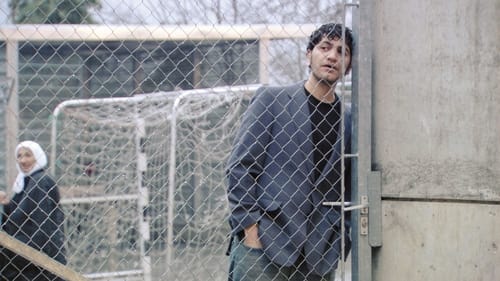
Fernand Melgar
出生 : 1961-07-04, Tànger, Morocco
略歴
Né en 1961 dans une famille de syndicalistes espagnols exilés à Tanger
au Maroc. Il accompagne clandestinement ses parents qui émigrent en
Suisse en 1963 comme travailleurs saisonniers. Il participe à la
fondation au début des années 80 le haut lieu de la culture underground
de Suisse romande, Le Cabaret Orwell. Après y avoir programmé de la
vidéo de création, il devient, en autodidacte, réalisateur et producteur
indépendant. À partir de 1983, il bricole des films expérimentaux et
des reportages iconoclastes pour la télévision. En 1985, il rejoint
l’association Climage et y réalise une dizaine de documentaires,
aujourd’hui films de référence sur les questions d’immigration et
d’identité. Son documentaire précédent Exit – le droit de mourir a reçu
plusieurs distinctions internationales dont le prestigieux Golden Link
UER Award de la meilleure coproduction européenne et le Prix du Cinéma
Suisse 2006. Lauréat du concours de scénario lancé par la Télévision
Suisse Romande, il prépare actuellement sa première fiction, Loin
derrière la montagne. Il vit et travaille à Lausanne.

Producer
The first experiences for five mentally handicapped children entering school, who will have to learn how to get along with the others: an almost impossible task, as they seem to be closed to the outside world. But gradually, the class takes shape before our eyes as the students move towards and against everything, much to the amazement and delight of their parents.

Director
The first experiences for five mentally handicapped children entering school, who will have to learn how to get along with the others: an almost impossible task, as they seem to be closed to the outside world. But gradually, the class takes shape before our eyes as the students move towards and against everything, much to the amazement and delight of their parents.

Director of Photography
It is winter at an emergency shelter for the homeless in Lausanne. Every night at the door of this little-known basement facility the same entry ritual takes place, resulting in confrontations which can sometimes turn violent. Those on duty at the shelter have the difficult task of “triaging the poor”: the women and children first, then the men. Although the total capacity at the shelter is 100, only 50 “chosen ones” will be admitted inside and granted a warm meal and a bed. The others know it will be a long night.

Producer
It is winter at an emergency shelter for the homeless in Lausanne. Every night at the door of this little-known basement facility the same entry ritual takes place, resulting in confrontations which can sometimes turn violent. Those on duty at the shelter have the difficult task of “triaging the poor”: the women and children first, then the men. Although the total capacity at the shelter is 100, only 50 “chosen ones” will be admitted inside and granted a warm meal and a bed. The others know it will be a long night.

Screenplay
It is winter at an emergency shelter for the homeless in Lausanne. Every night at the door of this little-known basement facility the same entry ritual takes place, resulting in confrontations which can sometimes turn violent. Those on duty at the shelter have the difficult task of “triaging the poor”: the women and children first, then the men. Although the total capacity at the shelter is 100, only 50 “chosen ones” will be admitted inside and granted a warm meal and a bed. The others know it will be a long night.

Director
It is winter at an emergency shelter for the homeless in Lausanne. Every night at the door of this little-known basement facility the same entry ritual takes place, resulting in confrontations which can sometimes turn violent. Those on duty at the shelter have the difficult task of “triaging the poor”: the women and children first, then the men. Although the total capacity at the shelter is 100, only 50 “chosen ones” will be admitted inside and granted a warm meal and a bed. The others know it will be a long night.

Director of Photography
The film recounts the fates of five of the protagonists of the film “Special Flight” following their expulsion from Switzerland. Having been wrenched away from the country in which they had lived and from their children because they had no papers, they are found again in Senegal or Kosovo, in Gambia or Cameroun, destitute and cut off from their families, sometimes even having been tortured upon arrival. This film broaches the private lives of these broken men and testifies to the brutality of a migration policy that is common in Switzerland and in Europe.

Producer
The film recounts the fates of five of the protagonists of the film “Special Flight” following their expulsion from Switzerland. Having been wrenched away from the country in which they had lived and from their children because they had no papers, they are found again in Senegal or Kosovo, in Gambia or Cameroun, destitute and cut off from their families, sometimes even having been tortured upon arrival. This film broaches the private lives of these broken men and testifies to the brutality of a migration policy that is common in Switzerland and in Europe.

Writer
The film recounts the fates of five of the protagonists of the film “Special Flight” following their expulsion from Switzerland. Having been wrenched away from the country in which they had lived and from their children because they had no papers, they are found again in Senegal or Kosovo, in Gambia or Cameroun, destitute and cut off from their families, sometimes even having been tortured upon arrival. This film broaches the private lives of these broken men and testifies to the brutality of a migration policy that is common in Switzerland and in Europe.

Director
The film recounts the fates of five of the protagonists of the film “Special Flight” following their expulsion from Switzerland. Having been wrenched away from the country in which they had lived and from their children because they had no papers, they are found again in Senegal or Kosovo, in Gambia or Cameroun, destitute and cut off from their families, sometimes even having been tortured upon arrival. This film broaches the private lives of these broken men and testifies to the brutality of a migration policy that is common in Switzerland and in Europe.

Producer
Switzerland still carries out special flights, where passengers, dressed in diapers and helmets, are chained to their seats for 40 hours at worst. They are accompanied by police officers and immigration officials. The passengers are flown to their native countries, where they haven't set foot in in up to twenty years, and where their lives might be in danger. Children, wives and work are left behind in Switzerland. Near Geneva, in Frambois prison, live 25 illegal immigrants waiting for deportation. They are offered an opportunity to say goodbye to their families and return to their native countries on a regular flight, escorted by plain-clothes police officers. If they refuse this offer, the special flight is arranged fast and unexpectedly. The stories behind the locked cells are truly heartbreaking.

Writer
Switzerland still carries out special flights, where passengers, dressed in diapers and helmets, are chained to their seats for 40 hours at worst. They are accompanied by police officers and immigration officials. The passengers are flown to their native countries, where they haven't set foot in in up to twenty years, and where their lives might be in danger. Children, wives and work are left behind in Switzerland. Near Geneva, in Frambois prison, live 25 illegal immigrants waiting for deportation. They are offered an opportunity to say goodbye to their families and return to their native countries on a regular flight, escorted by plain-clothes police officers. If they refuse this offer, the special flight is arranged fast and unexpectedly. The stories behind the locked cells are truly heartbreaking.

Director
Switzerland still carries out special flights, where passengers, dressed in diapers and helmets, are chained to their seats for 40 hours at worst. They are accompanied by police officers and immigration officials. The passengers are flown to their native countries, where they haven't set foot in in up to twenty years, and where their lives might be in danger. Children, wives and work are left behind in Switzerland. Near Geneva, in Frambois prison, live 25 illegal immigrants waiting for deportation. They are offered an opportunity to say goodbye to their families and return to their native countries on a regular flight, escorted by plain-clothes police officers. If they refuse this offer, the special flight is arranged fast and unexpectedly. The stories behind the locked cells are truly heartbreaking.

Producer
"Prud’hommes" is an immersion into the heart of a judicial court that handles disputes between employers and employees. This specific jurisdiction is a place of confrontation where the tensions, suffering and revolts that span the world of employment are exposed. In search of justice or recognition, employees speak out and face their employer face to face. This unique theatre plunges us into a real human drama and forces us to reflect upon today's society.

Producer
The personal stories of the people from all around the world waiting for a decision in an asylum-seekers centre in one of most restrictive countries in the world, Switzerland.

Director
The personal stories of the people from all around the world waiting for a decision in an asylum-seekers centre in one of most restrictive countries in the world, Switzerland.

Producer
Switzerland is presently the only country in the world where suicide assistance is legal. Exit: The Right to Die profiles that nation's EXIT organization, which for over twenty years has provided volunteers who counsel and accompany the terminally-ill and severely handicapped towards a death of their choice.

Director
Switzerland is presently the only country in the world where suicide assistance is legal. Exit: The Right to Die profiles that nation's EXIT organization, which for over twenty years has provided volunteers who counsel and accompany the terminally-ill and severely handicapped towards a death of their choice.

Editor

Screenplay

Director

Editor
Delphine Seyrig, an extraordinary woman and actress, died on October 15, 1990. From "Last Year at Marienbad" by Alain Resnais to "India Song" by Marguerite Duras, she played in 34 films for cinema, 13 films for television and 33 plays. Jacqueline Veuve, filmmaker and friend of Delphine Seyrig, wanted to break the silence that has fallen on her memory by making a documentary that traces with emotion and subjectivity the life of the mythical actress, the fierce feminist but also the simple friend.

Editor
This documentary show the work, the worries and the joys of a family dedicated to viticulture, the Potterat, living in Lavaux. Three generations live together, keeping the old traditions

Editor

Director

Editor

Editor

Director









